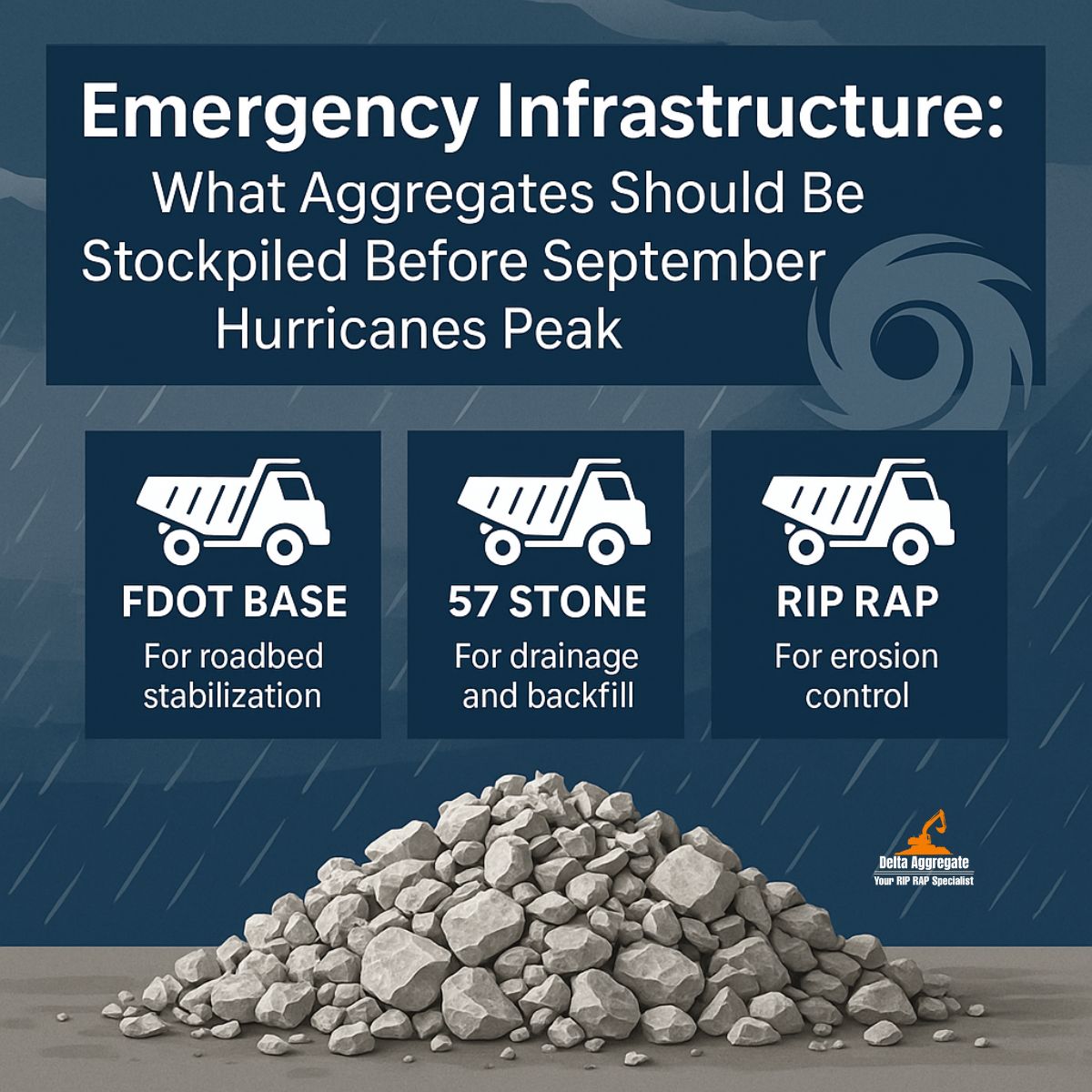September marks the height of hurricane season in Florida, and for contractors, municipalities, and project managers, that means one thing: preparation is critical. When storms hit, the demand for repair materials skyrockets, and access to the right aggregates can make the difference between swift recovery and costly downtime.
In this article, we’ll break down which FDOT-approved aggregates should be stockpiled ahead of peak hurricane season, how rip rap supports erosion control, and how Delta Aggregate helps keep Florida’s infrastructure storm-ready with rapid response capabilities.
Why September Planning Matters

Florida has historically seen the most hurricane activity in September. According to FEMA and the National Hurricane Center, these late-summer storms often cause the most damage to coastal and inland roads, seawalls, and drainage systems.
Waiting until after a storm is forecasted can create bottlenecks in the supply chain. That’s why contractors who plan now, stockpiling materials in advance, are positioned to respond faster and maintain project schedules even when emergencies strike.
Key takeaway: Emergency preparedness isn’t just about storm kits; it’s about having the right aggregates ready to deploy immediately.
Recommended FDOT Aggregates for Emergency Repair Kits
Based on our field experience and FDOT specifications, here are the materials every contractor should consider stockpiling before September:
- FDOT Base Rock – Provides stability for washed-out roads, shoulders, and culverts.
- FDOT #57 Stone – Versatile for drainage repairs, road sub-bases, and quick-fill applications.
- Rip Rap for Erosion Control – Essential for shoreline reinforcement, bridge abutments, and seawall protection. Class B and C rip rap are most commonly used for storm defense.
- Recycled FDOT Aggregate – Cost-effective and eco-friendly option for temporary roads and quick stabilization projects.
By keeping a mix of base rock, drainage stone, and rip rap on hand, crews can respond immediately to critical failures caused by storm surge or flooding.
How Rip Rap Protects Against Storm Damage
Rip rap is one of the most effective defenses against erosion. Large angular stones absorb wave energy and protect infrastructure from storm surge and high-flow water.
Applications include:
- Securing seawalls and levees
- Protecting bridge abutments from scour
- Reinforcing culverts and drainage outfalls
- Stabilizing washed-out slopes or embankments
Common mistake to avoid: Using the wrong size rip rap. For example, smaller Class A rip rap won’t hold up against hurricane-level surges. FDOT Class C rip rap is the go-to for heavy coastal protection.
Delta Aggregate’s Emergency Support
Based on our experience supplying Florida contractors, we know that storm recovery is all about speed and logistics. That’s why Delta Aggregate:
- Maintains quick-deploy stock of FDOT-approved aggregates and rip rap.
- Offers rapid delivery across Florida with trusted trucking partners.
- Provides guidance on selecting the right material for urgent repairs.
We’ve supported municipalities and contractors through multiple hurricane seasons, and our process is built around helping teams rebuild infrastructure quickly and safely.
Best Practices for Contractors Planning Ahead
- Forecast Material Demand – Use FEMA hazard maps and local flood-prone zones to predict which areas will need reinforcement.
- Order in Advance – Don’t wait for the supply chain to tighten. Secure base rock and rip rap now.
- Create Local Stockyards – Position materials near vulnerable project sites to save on hauling delays.
- Train Crews – Ensure workers know how to deploy rip rap and drainage stone effectively for emergency stabilization.
FAQ
Q: How much rip rap should I stockpile for hurricane season?
A: It depends on your project scope. For coastal municipalities, plan for at least one truckload of FDOT Class C rip rap per mile of shoreline defense. Contractors should coordinate with suppliers to calculate needs.
Q: Can recycled aggregates be used in storm repairs?
A: Yes, recycled FDOT aggregates are excellent for temporary roads, staging areas, and quick sub-base stabilization. They’re cost-efficient and environmentally friendly.
Q: How fast can Delta Aggregate deliver after a storm?
A: Our logistics team prioritizes emergency deliveries and partners with haulers across Florida to ensure aggregates arrive within hours of order placement.
Conclusion
September is the most active, and most dangerous month of Florida’s hurricane season. By stockpiling FDOT aggregates and rip rap now, more contractors and municipalities can avoid costly delays and respond rapidly to infrastructure damage.
Visit the Delta Blog for more storm-prep insights or Contact Us today to secure your emergency aggregate supply.
Delta Aggregate: Florida’s trusted partner for storm-ready infrastructure.